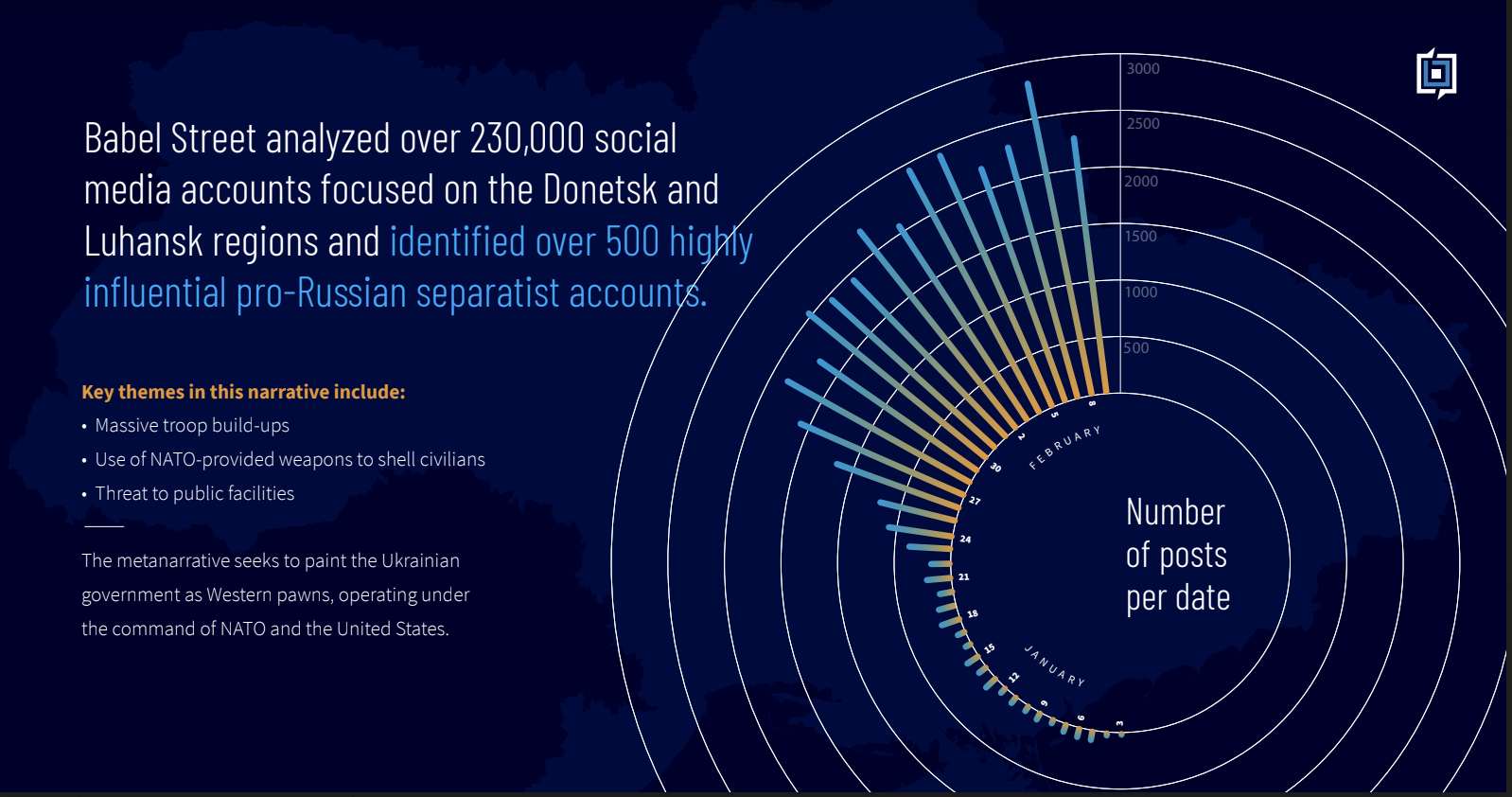
Disinformation by social media influencers adds to Russia-Ukraine tensions
As the Russia-Ukraine situation heats up by the minute, disinformation campaigns have ramped up exponentially. Official government communications—including statements, press releases, interviews and online content—play a crucial role in any analysis of the conflict, but there is another key source of influence that must be considered: social media.
Babel Street found that Russia/Ukraine-focused social media chatter began to increase significantly on or around 23 January 2022 with a massive jump between 24-26 January.
The crux of these posts? Pro-Russian separatists in the eastern Ukrainian provinces of Donetsk and Luhansk are portraying Kyiv as an aggressor operating under the direction of the United States and NATO.
Meanwhile, pro-Ukrainian social media influencers are attempting to counter this narrative with accusations of Russian aggression and by exposing what they claim to be disinformation on the part of pro-Moscow activists.
American and European interests cannot be understated. Along with the political impact of a potential invasion of Ukraine by Russia, the impact on national security for both Europe and the U.S. could be tremendous. This includes the potential humanitarian crisis that could result from a full-scale incursion and the human rights abuses that could follow as well.
Urgent situations demand real-time awareness
The surge in social media posts that started in late January was not caused by one or two stories being shared and reshared. Instead, these were mostly original, unique posts. The jump was due to a large number of separatists posting simultaneously, not just a few accounts pumping up the numbers—and the increased social media traffic has continued to rise. All of this seems to point to a concerted, sophisticated messaging campaign by pro-Moscow forces in eastern Ukraine.
Babel Street analyzed over 230,000 social media accounts focused on the Donetsk and Luhansk regions, and identified over 500 highly influential pro-Russian separatist accounts.
Over the past two weeks, an increasingly consistent narrative has emerged from these social networks. Key influencers have spread accusations of Ukrainian aggression and human rights violations. Important themes in this narrative include the use of NATO-provided weapons to shell civilians, and threat to public facilities, including the mining of schools and universities.
At the same time, the head of the breakaway Donetsk People’s Republic, Denis Pushilin, claims that Ukrainian forces are preparing for an aggressive move and has asked for Russian troops to support the rebels.
In addition to portraying Kyiv as the aggressive party, the metanarrative seeks to paint the Ukrainian government as Western pawns, operating under the command of NATO and the United States. Posts promote the idea that Ukrainian forces are poised to launch an operation to retake eastern provinces pending the command from Washington.
Ukrainian influencers countering pro-Russia chatter
While the separatist social media campaign in eastern Ukraine is robust, it is not without opposition. Social media influencers are seeking to expose this alleged disinformation campaign.
Pro-Ukrainian users in the region have sought to push their own narrative that clearly shows Moscow as the author of hostilities in the region.
This counter-narrative claims that the separatists' accusations are false and intended to provide justification for a Russian invasion of Ukraine. In other words, Moscow would be seen as justified in sending troops across the border to save ethnic Russians from ongoing human rights violations and the unjust military actions of Kyiv.
Key to this effort has been highlighting exposed propaganda efforts and the “dangerous” actions of Russia (i.e., nuclear exercises) and its allies (specifically, Belarus’ threat to send troops into eastern Ukraine).
Conclusion
By continually searching key terms and public resources, Babel Street can uncover relevant social posts in near real-time. We can clearly see both the volume and sentiment surrounding attempts to influence local and global sentiment for a fluid situation like this one. Searching in native languages improves the results, as relevant posts using slang and local idioms contribute to a more nuanced understanding of these campaigns.
The balance of perceptions is constantly shifting. Publicly facing channels can provide vital clues to intent, sentiment and action the moment they appear, giving leaders worldwide the insight—and the time—to prepare a response.